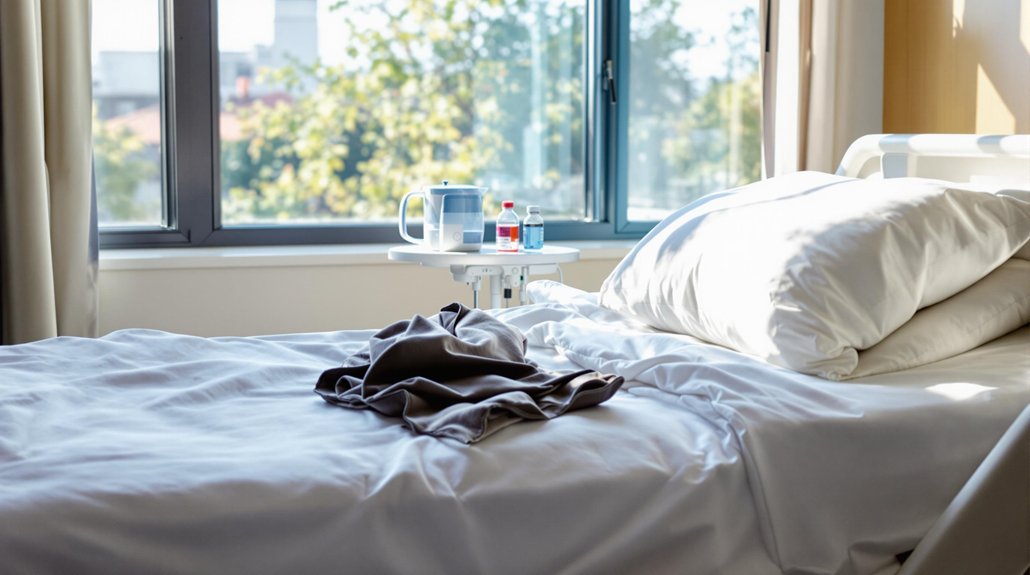You’ll need about 12 weeks for complete internal healing after a hysterectomy, though your recovery timeline depends on the surgical approach used. Vaginal procedures heal fastest at 3-4 weeks, while abdominal surgeries take 6-8 weeks before you can resume normal activities. During this time, your body repairs tissue, forms scar tissue, and rebuilds internal strength. Understanding the week-by-week healing process can help you better navigate your recovery journey.
Understanding Different Types of Hysterectomy and Their Recovery Periods
While every person’s healing journey is unique, understanding the type of hysterectomy you’ll undergo helps set realistic recovery expectations.
The main types of hysterectomy include vaginal, abdominal, and laparoscopic procedures, each with distinct recovery variations.
Vaginal hysterectomies typically offer the fastest recovery, often letting you return to light activities within 3-4 weeks.
With abdominal surgery, you’ll need 6-8 weeks before resuming normal activities due to the larger incision.
Laparoscopic procedures usually fall between these timeframes, with most patients recovering within 4-6 weeks.
Your healing timeline also depends on whether you’ve had a partial, total, or radical hysterectomy.
The more extensive the procedure, the longer you’ll need to rest and allow your body to heal properly.
Proper post-operative care support is essential for reducing complications and ensuring smooth recovery during the healing process.
The Internal Healing Timeline: Week by Week
Understanding the internal healing process after your hysterectomy helps you track your progress and know what to expect.
During weeks 1-2, your internal stitches begin healing as inflammation decreases. You’ll notice reduced vaginal discharge and minimal discomfort.
The first two weeks bring gradual healing of internal stitches, with diminishing inflammation, less discharge, and improved comfort levels.
By weeks 3-4, internal recovery progresses as your vaginal cuff starts forming stronger scar tissue, marking important healing milestones.
Weeks 5-6 bring significant internal healing, though you still need to avoid heavy lifting. Your body continues repairing tissue and settling into its new normal.
At weeks 7-8, most internal structures have healed substantially. By week 12, you’ll reach nearly complete internal healing, though some subtle changes may continue for several months.
Remember that everyone’s healing journey varies, so always follow your doctor’s specific guidance.
Personalized recovery plans from specialized home care services can help ensure safe and effective healing during your post-surgical recovery period.
Physical Changes and Tissue Repair During Recovery
As your body recovers from a hysterectomy, you’ll notice several distinct physical changes. Your tissue regeneration process works continuously to repair surgical sites while promoting physical recovery. Understanding these changes helps you support others going through similar experiences.
| Physical Change | Recovery Impact |
|---|---|
| Inflammation | Peaks days 2-4, then gradually decreases |
| Scar Formation | Begins week 1, continues for months |
| Vaginal Changes | Length adjusts, support structures strengthen |
| Hormone Shifts | Body adapts to new hormone levels |
| Internal Healing | Ligaments and tissues rebuild strength |
Your body’s natural healing abilities work around the clock to restore function and stability. You’ll feel improvements weekly as internal tissues strengthen and repair themselves. Supporting this healing process through proper rest, nutrition, and following your doctor’s guidelines guarantees ideal recovery. Physical therapy services can significantly enhance mobility and rehabilitation during your post-surgery recovery period.
Hormonal Adjustments After Surgery
Depending on whether your ovaries were removed during the hysterectomy, you’ll experience different types of hormonal changes.
If your ovaries remain, they’ll continue producing hormones, though you may notice mild hormonal fluctuations as your body adjusts to the absence of your uterus.
Without ovaries, you’ll enter surgical menopause immediately after surgery. This sudden change can trigger more intense symptoms, including hot flashes, mood swings, and sleep disturbances.
Your doctor may recommend hormone replacement therapy to help manage these changes and support your recovery.
During this time, emotional adjustments are common as your body adapts to its new hormonal balance.
Supporting others who’ve undergone similar experiences can be therapeutic, and joining support groups often helps you navigate this shift while helping fellow patients understand their journey.
Grief counseling services can provide additional emotional support during this transitional period as you adjust to hormonal changes.
Common Complications That May Delay Internal Healing
While most hysterectomies heal without issues, several complications can slow your internal recovery. Understanding these healing factors can help you identify potential problems early and seek appropriate medical care.
- Infection at the surgical site, which may cause fever, increased pain, or unusual discharge
- Blood clots in your legs or pelvic area that can lead to swelling and discomfort
- Damage to surrounding organs like your bladder or bowels during surgery
- Vaginal cuff separation, where the top of the vagina doesn’t heal properly
- Internal adhesions or scar tissue that can cause ongoing pelvic pain
If you experience any of these complications, contact your healthcare provider immediately.
Prompt attention to infection risks and other healing complications will help guarantee your recovery stays on track and prevent long-term issues.
Similar to post-cataract surgery care, maintaining proper eye protection and hygiene is crucial for preventing infections and promoting optimal healing during recovery.
Supporting Your Body’s Natural Healing Process
You’ll heal faster after your hysterectomy by supporting your body’s natural recovery process with specific lifestyle changes and healthy habits.
Focus on getting adequate rest, staying hydrated, and maintaining a balanced diet rich in protein, vitamins, and minerals. Consider incorporating natural remedies like herbal teas and gentle movements when your doctor approves physical activity.
Proper nutritional support plays an essential role in healing.
Good nutrition is your body’s foundation for healing, providing the building blocks needed for successful surgical recovery.
Include foods high in vitamin C to promote collagen formation, zinc-rich options to support immune function, and plenty of fiber to prevent constipation.
You can also help others in their recovery journey by sharing your successful healing strategies.
Remember to listen to your body’s signals and never hesitate to contact your healthcare provider if you experience unusual symptoms during recovery.
Recognizing Signs of Complete Internal Recovery
As your body heals from a hysterectomy, several key indicators will signal complete internal recovery. Understanding these recovery milestones helps you track your progress and support others going through similar experiences.
- You’ll notice post surgery symptoms gradually diminishing, with minimal to no pelvic discomfort during daily activities.
- Your energy levels will return to normal, allowing you to resume regular routines without excessive fatigue.
- Bladder and bowel functions will stabilize, operating as they did before surgery.
- You’ll experience no unusual vaginal discharge or spotting, indicating internal healing is complete.
- Your emotional well-being improves as hormones balance and you feel more confident in your physical capabilities.
Remember that everyone’s healing journey differs, but these signs typically emerge within 6-8 weeks post-surgery.
Always consult your healthcare provider to confirm your recovery progress.
Conclusion
Your body’s healing journey after a hysterectomy is like a flower slowly blooming – it takes time and patience. Most women start feeling better after 6-8 weeks, but your body needs 3-6 months to heal completely inside. You’ll know you’re ready when you can go about your day with good energy, little to no pain, and a return to your usual activities.
Remember, every woman heals differently, and that’s perfectly normal. Listen to what your body tells you, and don’t push yourself too hard. You’re not walking this path alone – many women have been through this same experience, and we understand what you’re going through.
Focus Family Care is here to support you every step of the way, with caring professionals who know exactly how to help you recover safely and comfortably. Your health and comfort are our top priority.
If you or a loved one need help, don’t wait. Reach out to Focus Family Care today at (561) 693-1311 or email us at info@focusfamilycare.com.





